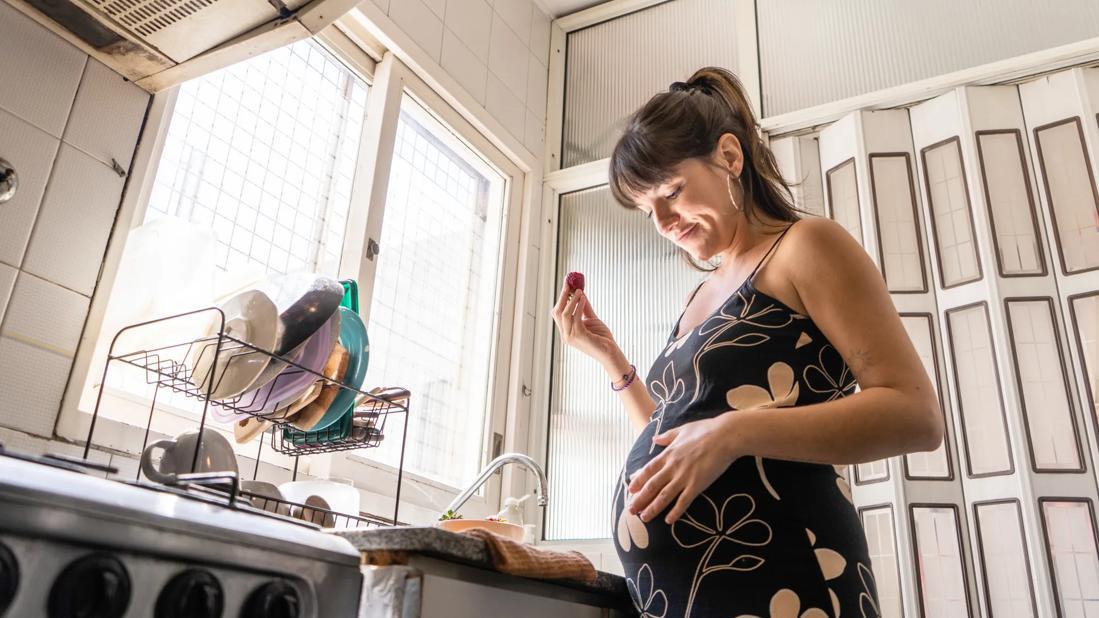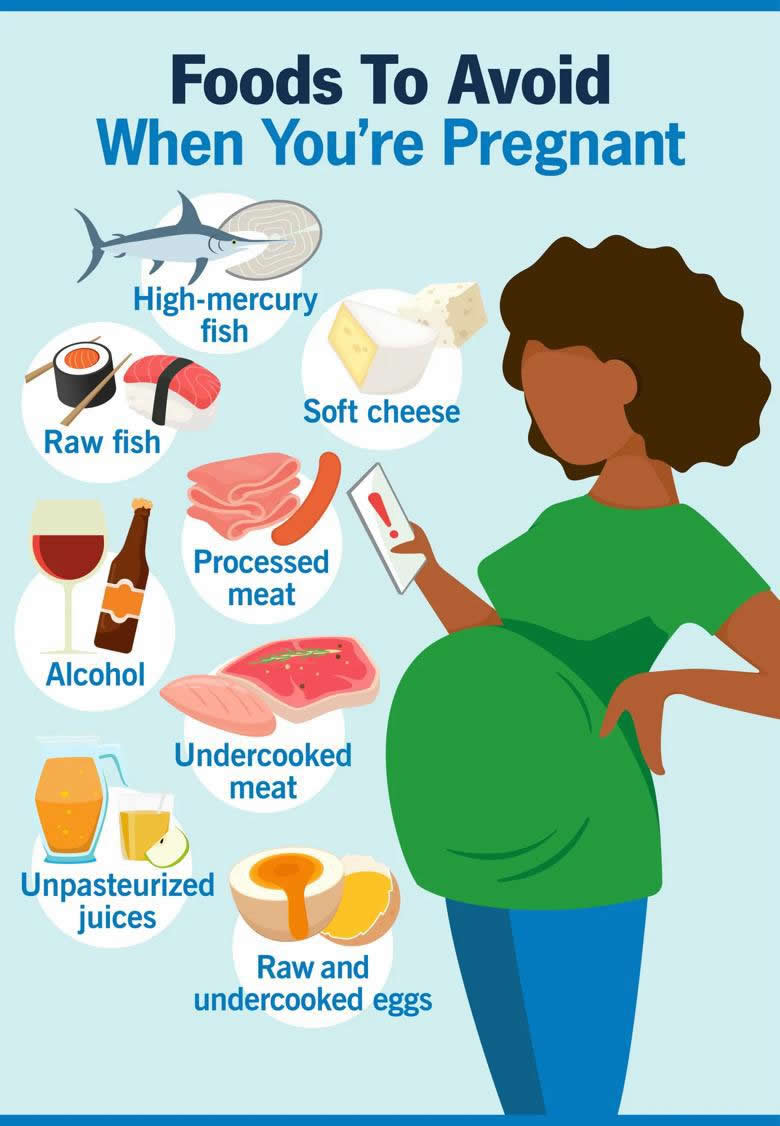Foods To Avoid During Pregnancy
Avoid high-mercury fish and processed meat, and go easy on salt and caffeine

When you’re pregnant, it’s important to eat a healthy diet that provides the nutrients you need. That helps keep you feeling your best and promotes healthy fetal development.
There are also some foods and drinks you should avoid during pregnancy. That’s because they can be potentially harmful to you or the fetus, says Ob/Gyn Edward Chien, MD.
Food and drinks to avoid when you’re pregnant

When you’re pregnant, the foods you eat affect more than your own body.
“During pregnancy, you’re at a higher risk for foodborne illness,” Dr. Chien says. “And some foods and drinks can increase your risk for pregnancy complications, such as early delivery or miscarriage.”
From sushi to super salty snacks, here’s what to avoid.
Avoid: High-mercury fish
When you’re pregnant, you’ll want to avoid fish with elevated levels of mercury. Having too much mercury when you’re pregnant can cause brain damage or developmental delays.
According to guidelines from the U.S. Food and Drug Administration (FDA), pregnant women should avoid the following fish, which have the highest levels of mercury:
- Bigeye tuna
- King mackerel
- Marlin
- Orange roughy
- Tilefish from the Gulf of Mexico
- Shark
- Swordfish
Avoid: Raw or undercooked meat and fish
Raw and undercooked meat, fish and shellfish have a higher risk of containing bacteria, viruses and parasites that can cause food poisoning. While those little bugs may not have affected you before you were pregnant, they can make you sick and harm the fetus when you’re pregnant.
During pregnancy, avoid:
- Sushi
- Sashimi
- Any raw fish or shellfish
- Rare, medium-rare or medium meat, like steak and hamburgers
Avoid: Raw or runny eggs
While we’re on the topic of undercooked proteins, let’s talk eggs.
In general, it’s best to avoid eating raw eggs because of potential exposure to Salmonella.
When you’re pregnant, the effects of Salmonella can be worse. In rare cases, it can even cause sepsis, a serious infection that can lead to fetal brain and lung problems. It can even cross the placenta and infect the fetus, leading to serious problems.
Steer clear of foods made with raw eggs when you’re pregnant, too. This could include some common foods such as:
- Homemade Caesar dressing (the packaged bottles are typically safe)
- Homemade mayonnaise
- Hollandaise and béarnaise sauce
- Uncooked cake batter and cookie dough (even if it’s eggless, uncooked flour can contain E. coli and Salmonella)
- Homemade royal or meringue icing
- Mousse
- Tiramisu
These foods don’t always have raw eggs as ingredients, but they may. Check the nutrition label (or ask the chef) before indulging.
If you’re having fried eggs, make sure both the yolks and whites are firm (over-well). If you’re scrambling them, make sure they’re firm throughout.
Avoid: Processed meat
Processed meats are best avoided during pregnancy, Dr. Chien says. That’s because they carry a higher risk of the dangerous Listeria bacteria.
“When you’re pregnant, Listeria can cause similar flu-like symptoms, or it may not cause any symptoms in you at all,” Dr. Chien notes. “But it can severely impact the development of your growing fetus. It can even cause preterm delivery, miscarriage or fetal death.”
Avoid foods like:
- Lunch meats (cold cuts, deli meat or cold hot dogs)
- Fermented or dry sausages
- Refrigerated pâté or meat spreads from a deli, meat counter or a grocery store’s refrigerated section
Avoid: Soft cheese
Soft cheeses are more likely to be unpasteurized. That means they haven’t been treated with heat to kill off certain common bacteria.
Consuming unpasteurized products when you’re pregnant can put you at a higher risk of Listeria. Unpasteurized cheeses to avoid include:
- Brie
- Camembert and other bleu cheeses
- Feta
- Queso blanco, fresco or panela
Some brands of these cheeses may be pasteurized. Check the label to be sure. If it says the product is “made with pasteurized milk,” it’s safe. If not, stay away.
Avoid: Unpasteurized juices
Similar to soft cheeses, some juices and ciders may be unpasteurized and should be avoided when you’re pregnant. These drinks are most commonly found at some health food stores and farmers’ markets.
Again, check the label to see whether the products you’re choosing have been pasteurized. Hints they may be unpasteurized include words like “natural” or “fresh-squeezed.”
Avoid: Alcohol
This one shouldn’t come as a surprise. Drinking alcohol affects fetal development and has lifelong consequences, including behavioral, physical and learning problems.
“You want to avoid all beer, wine and hard liquor during pregnancy,” Dr. Chien advises. “There’s no safe level of consumption.”
Drinking alcohol during pregnancy can lead to fetal alcohol syndrome (FAS). FAS is a severe condition that can’t be cured. It can also result in birth defects that affect your child’s heart, eyes, bones, ears and kidneys.
Limit: Salt
Salt causes your body to retain water, so Dr. Chien recommends eating salty foods in moderation during pregnancy.
“Too much salt could cause your blood pressure to rise, increasing your risk for preeclampsia, a pregnancy complication characterized by high blood pressure and swelling due to fluid retention,” he adds.
Limit: Caffeine
Yes, you can still have your daily morning coffee, but you may need to cut back on caffeine while you’re pregnant. Researchers say caffeine may cause the blood vessels in your uterus to tighten up, which lowers blood supply and affects fetal growth.
How much caffeine a drink has can vary tremendously depending on how it’s prepared.
“During your pregnancy, you’ll want to limit your consumption of caffeine to no more than 200 milligrams (mg) per day,” Dr. Chien states.
For reference, a standard cup of coffee (not your jumbo travel mug, but a regular-sized one) contains about 100 mg of caffeine. So, stick to no more than two cups of coffee per day when you’re pregnant.
Keep in mind that black, chamomile and green teas also contain some caffeine. Similar to coffee, these can be consumed in moderation, although caffeine levels vary depending on how much tea you use and how it’s prepared.
If you have any questions about what foods to eat and which to avoid during your pregnancy, don’t hesitate to ask your healthcare provider. They’ll be able to advise you best on how to keep you healthy and encourage healthy fetal development.